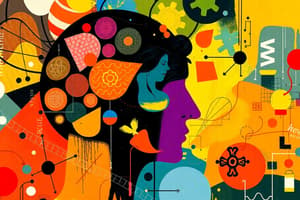Podcast
Questions and Answers
Science involves making observations, asking questions, conducting experiments, and drawing conclusions based on evidence.
Science involves making observations, asking questions, conducting experiments, and drawing conclusions based on evidence.
True (A)
Galileo discovered that Saturn had moons.
Galileo discovered that Saturn had moons.
False (B)
In science, empirical evidence is used to test ideas against real-life occurrences.
In science, empirical evidence is used to test ideas against real-life occurrences.
True (A)
Science encompasses fields like biology, chemistry, and history.
Science encompasses fields like biology, chemistry, and history.
Scientists use the scientific method to communicate their findings.
Scientists use the scientific method to communicate their findings.
Science allows scientists to make predictions and advance human understanding of the universe.
Science allows scientists to make predictions and advance human understanding of the universe.
Science helps us understand natural phenomena like weather patterns and solar system movements.
Science helps us understand natural phenomena like weather patterns and solar system movements.
Humans used to believe in heliocentrism, which is the idea that Earth is stationary.
Humans used to believe in heliocentrism, which is the idea that Earth is stationary.
Advances in technology such as vaccines, smartphones, and GPS systems often stem from scientific breakthroughs.
Advances in technology such as vaccines, smartphones, and GPS systems often stem from scientific breakthroughs.
If different scientists get conflicting results, it means you have solid evidence supporting your explanation.
If different scientists get conflicting results, it means you have solid evidence supporting your explanation.
Charles Darwin developed the theory of evolution after studying plants and animals on his voyage aboard HMS Beagle.
Charles Darwin developed the theory of evolution after studying plants and animals on his voyage aboard HMS Beagle.
Genetic analysis has confirmed that birds, reptiles, and mammals do not share a common ancestor.
Genetic analysis has confirmed that birds, reptiles, and mammals do not share a common ancestor.
Flashcards are hidden until you start studying
Study Notes
Introduction
Science is a systematic approach to understanding the world around us by making observations, asking questions, conducting experiments, and drawing conclusions based on evidence. It encompasses various fields of study such as biology, chemistry, physics, psychology, and many others. In essence, science involves acquiring knowledge through observation, testing hypotheses, measuring results, and developing theories. This process allows scientists to make predictions, solve problems, and advance human understanding of our universe.
What Is Science?
Scientific methods involve questioning, experimenting, observing, and communicating findings with the aim of discovering truths about nature, society, and the universe. Scientists do this by using empirical evidence, which means they have tested their ideas against what actually happens in real life. For example, Galileo used his telescope to observe the night sky and found that Jupiter had moons—a discovery he described in scientific papers, shared with other astronomers, and published for all to see.
In every branch of science, there's always more to learn about how things work and why they happen the way they do. As new information comes along, old ideas can change. That's part of the fun! And it also helps keep scientists from getting too sure of themselves and their beliefs.
Why Do We Need Science?
Science provides answers to many important questions we may have about ourselves, our planet, and the universe beyond. It enables us to understand natural phenomena like weather patterns and solar system movements. Without science, humans would still believe in geocentrism (the idea Earth is stationary), think diseases were caused by demons, or assume the earth was flat. Additionally, advances in technology often come from scientific breakthroughs, such as vaccines, smartphones, and GPS systems.
Another reason why we need science is its ability to prevent future harm. For instance, because of climate change studies conducted over several decades, scientists now know exactly when certain regions will experience extreme heat waves. This knowledge has helped policy makers plan ahead, reducing the likelihood of people dying due to extreme temperatures.
How Does Science Work?
The heart of science lies in the scientific method, where scientists ask questions, collect data, develop explanations, test these explanations, refine them, and share the results. If many scientists repeat your experiments and get similar results, you've got solid evidence that supports the explanation. However, if different scientists get conflicting results, you might need to start over again and figure out what went wrong in your original experiments.
One key concept underlying much of modern science is the theory of evolution, which explains how species change over time. Charles Darwin developed this groundbreaking idea after studying plants and animals during his voyage aboard HMS Beagle. His book 'On the Origin of Species' presented strong arguments supporting the idea that living creatures evolved over millions of years from common ancestors. Since then, genetic analysis has confirmed that birds, reptiles, and mammals all descend from a common ancestor known as the theropod, while flowering plants evolved from non-flowering ones called gymnosperms.
Conclusion
Throughout history, science has been instrumental in advancing human knowledge, improving lives, and shaping our understanding of the world. Whether investigating the inner workings of cells or exploring the vastness of space, science continues to challenge existing assumptions and push boundaries, constantly reminding us that our place in the universe remains full of mysteries waiting to be unraveled.
Studying That Suits You
Use AI to generate personalized quizzes and flashcards to suit your learning preferences.




